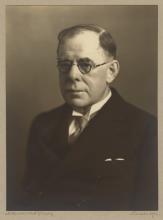Alfred Edward Taylor, philosopher, was born at Oundle on 22 December 1869, to the Reverend Alfred Taylor, a Wesleyan minister, and Caroline Esther Fax. He was educated at Kingswood School, Bath, and at New College, Oxford, of which he was elected a scholar and, in 1931, an honorary fellow. He obtained literae humaniores in 1891.
Taylor began his career with a prize fellowship at Merton College, Oxford in 1891. He then served as an assistant lecturer in Greek and philosophy at the University of Manchester (1896–1903), as Frothingham Professor of at McGill University, Montreal (1903–1908) and as a professor of moral philosophy at the University of St Andrews (1908–1924). He ended his career with a professorship of moral philosophy at the University of Edinburgh, from which he retired in 1941, though he continued to do the work of the chair until 1944.
In 1900, he married Lydia Justsum (d. 1938), an author and second daughter of Edmund Passmore of Ruggs, Somerset. They had one son.
Taylor contributed to British idealism (Elements of Metaphysics, 1903) and theistic metaphysics (Does God Exist?, 1945). His work as a moralist and profound student of Plato and Aristotle as well as of Kant’s ethics, though, is perhaps his most important (Plato: The Man and His Work, 1926; and A Commentary on Plato’s ‘Timaeus’, 1927).
Throughout his career Taylor received many honours, including the fellowship of the British Academy (1911) and several honorary degrees. He died at his home, Mornscott, 20 Ross Road, Edinburgh, on 31 October 1945.
Other works by Taylor include: The Problem of Conduct: A Study in the Phenomenology of Ethics (1901); Elements of Metaphysics (1903); Thomas Hobbes (1908); Plato (1908);Epicurus (1911); Varia Socractica (first series, 1911); Platonism and Its Influence (1924);David Hume and the Miraculous (1927); Plato and the Authorship of the Epinomis (1929);Socrates (1932); Philosophical Studies (1934); The Christian Hope of Immortality (1938);Does God Exist? (1945).
*From Donald M. MacKinnon, revised by Mark J. Schofiled, Oxford Dictionary of National Biography (Oxford University Press, 2004), http://www.oxforddnb.com/view/article/36426.



